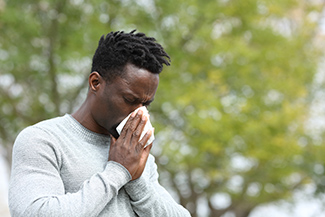Allergies affect millions of people daily.
“When our body gets exposed to a trigger, our immune system recognizes it as dangerous, even though it may not be, and attacks it,” says Dr. Alicia Alvarez, an allergist and immunologist with First Physicians Group. “This causes a chain reaction.”
It is this allergic reaction by the immune system that leads to allergy symptoms. Environmental allergens can cause itchy watery eyes, nasal congestion and drainage and sneezing. Other allergic reactions to medications and food can be severe and include skin rashes, swelling, shortness of breath and low blood pressure.
So how do you stop your immune system from overreacting? First you have to figure out your triggers.
Testing and Diagnosis
It can often be difficult to determine if a reaction is caused by an allergy, and that’s when a diagnosis by an allergist is important. An allergist can determine an allergic reaction based on some simple testing.
“The gold standard is monitoring what happens when you’re exposed to different allergic triggers,” says Dr. Alvarez.
The most common test for allergies is a simple skin prick test which exposes the skin to several specific allergens. This is sometimes called a scratch test. A small bit of the allergen is applied to the skin and a skin pricking device will introduce the allergen into the top layer of the skin. While no needles are used during this procedure, it can feel like a sharp poke, After 15-20 minutes, the allergist or nurse checks the results. “And if there’s a small local reaction,” says Dr. Alvarez, “we can identify that as an allergy for you.” Positive reactions can look like red, raised mosquito bites and feel itchy.
Skin testing can include many allergens at once. This testing can be done on the back or forearm. Rarely, additional forms of skin testing include small injections in the skin. This is typically done for penicillin allergy testing.
Blood testing is also available, although it may not be as comprehensive. But it’s a great option for people who cannot complete a skin test due to conflicts with medications. Sometimes if the skin is very sensitive, a blood test may be a more accurate option.
“Once we identify what the allergies are,” says Dr. Alvarez, “we can be more proactive.”
Treatment
Immunotherapy is a long-term treatment option with lots of success. It repeatedly exposes the body’s immune system to the allergen at specified doses until the immune system longer overreacts.
“Over time, we can desensitize the immune system to induce tolerance,” says Dr. Alvarez. “We really change that underlying mechanism, which is stronger than just taking medicine to treat the symptoms.”
Immunotherapy is typically administered through a carefully controlled dose via an allergy shot. The build-up phase begins with the patient receiving weekly shots at the Allergist’s office for a few months.
The maintenance phase is next and allows the patient to receive injections monthly over the course of a few years. “It’s a long process,” says Dr. Alvarez, “but the impact and the benefit will last for several years, even after you stop immunotherapy.”
New approaches to immunotherapy also include allergy drops and under-the-tongue tablets instead of shots.
In addition to seeing an allergist for testing and treatment, you can do a few things at home to reduce your symptoms by limiting your exposure to certain allergens. In addition to simple avoidance of recognized triggers, try these suggestions:
- For dust and dust mites: clean regularly, keep the humidity low in the house and remember to wash your sheets and pillow cases weekly. Using a mask can help limit symptoms while cleaning.
- For pollen: Limit time outdoors when the pollen count is high and keep windows shut. When you do go outside, consider wearing a mask or sunglasses for protection. When you come inside, change your clothes and wash your hair and face. A saline nasal spray can also help rinse allergens from the nose.
- For pets: if they’re inside pets, then your best bet is to keep them out of the bedroom, so you can at least have a place to sleep with less dander. There is some evidence that washing pets weekly can reduce allergen levels. There are also some cat foods that can reduce allergen levels.
But if symptoms persist—especially any affecting your breathing by causing wheezing or shortness of breath—contact a healthcare provider ASAP.
Allergy Evaluation
If you are dealing with allergies or think you might have allergies, click here to request an appointment.
Dr. Alvarez is currently seeing patients at the following locations:
- FPG Silverstein Institute at Lakewood Ranch
6230 University Parkway, Suite 203
Lakewood Ranch, FL 34240 - FPG Allergy at Floyd St.
1901 Floyd St.
Sarasota, FL 34239 - FPG Silverstein Institute at Venice MOB
200 Healthcare Way, Suite 200
Venice, FL 34275
Call (941) 366-9222 for information and appointments.


